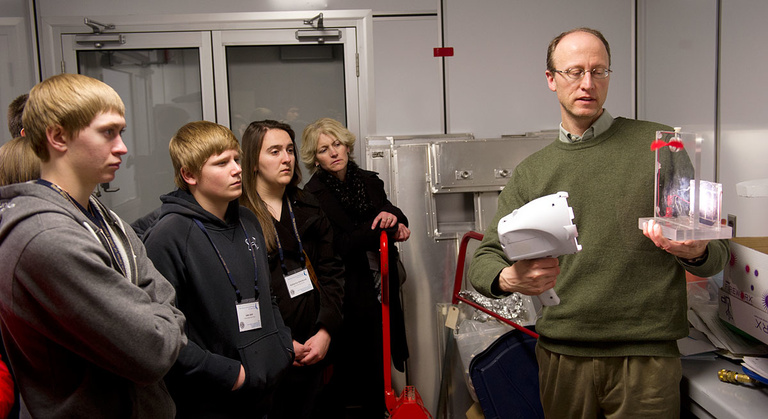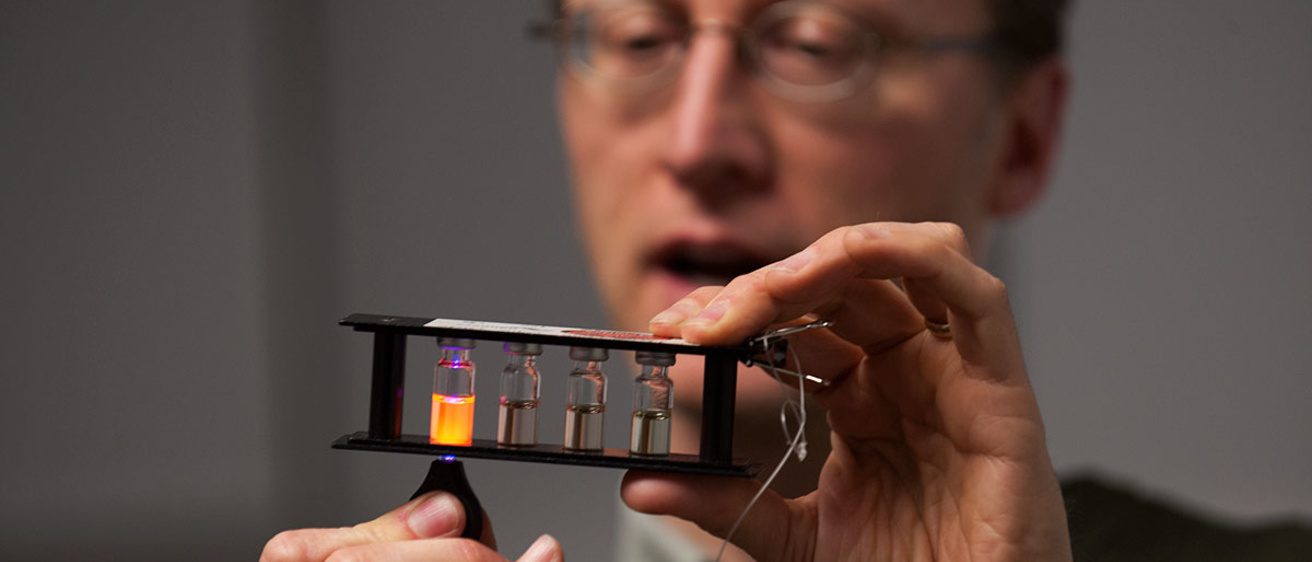When Kortney Banks and Hannah Sprouse applied to present in the Iowa Regional Junior Science and Humanities Symposium, a research symposium that highlights high school research on STEM topics, they did not expect to be selected.
“We thought it was crazy. We are only ninth graders,” says Banks.
Banks and Sprouse, both from Keosauqua, Iowa, presented their original research, “The Effects of Biochar on Plant Growth.” Their project explored how a soil conditioner, biochar, affected the growth of tomatoes, radishes, corn, and soybeans.
Their presentation was a part of the annual Iowa Regional Junior Science and Humanities Symposium (JSHS) funded by the U.S. Army, Navy, and Air Force.
To view a related video, visit Choosing STEM excellence.
The symposium is hosted by the University of Iowa College of Education’s Belin-Blank Center for Gifted Education and Talent Development.
“What we have here is this funneling-up of Iowa at its best,” says Susan Assouline, director of the Belin-Blank Center. “You’ve got these students and teachers from all across Iowa, and they’re presenting research and being evaluated by professionals and their peers. These students are courageous to stand up and share their work.”
The symposium, which took place Feb. 27 and 28, included 15 original research presentations by a select group of students. Of those 15 presentations, five students were selected for an all-expense paid trip to Washington D.C. for the national Junior Science and Humanities Symposium. Of those five students, two will present at the national conference.
This year, Breanna Kramer, from Donnellson, won first place for her research “Silver Nitrate’s Affect on Natural vs. Induced Antibiotic Resistance in Escherichia coli.” Second place was awarded to Aparna Ajjarapu, from Ames, for her project “Isolation of Escherichia coli O157 proteins that interact with the Bovine recto-anal junction squamous epithelial (RSE) cells.” Kramer and Ajjarapu will both present at the national symposium.
Third place was Christopher Grebner, from Dyersville, for his research “The Effects of Cheese Sludge on Field Corn,” and fourth place went to Abby Walling, from Iowa City West High School, for her study “Waste No More: An Innovative Study of the Net Energy Gain of Cellulosic Ethanol from Recycled Matter.”
Fifth place was awarded to Karleigh Schilling of Cedar Rapids for her project, “The Effects of Urbanization on Water Quality of Streams in Linn County.” Grebner, Walling, and Schilling will also attend the national symposium in Washington D.C.

Aside from the presentations, the UI hosted tours of many different laboratories on campus for the over 150 students who attended the symposium.
Departments, colleges, and units that opened up their facilities and shared their expertise include the following:biology, chemistry, hydroscience and engineering, the UI Natural History Museum, nursing, physics, UI Health Care, pharmacy, computer science, and psychology
Dylan Mittauer, from Prairie Point Middle School in Cedar Rapids, went on a cell microbiology tour where he studied the division of chromosomes in nematodes.
“I’ve never seen something like this before,” says Mittauer. “It’s cool to read and hear about something, but I’ve never seen a nematode before.”
The UI College of Education’s Belin-Blank Center has organized the symposium since 2011.
“Belin-Blank Center staff bring a great deal of strength from a diverse set of backgrounds: technology, STEM education, administrative,” says Assouline. “We work together as a center. We’ve had a whole team working on this symposium.”
Special highlights of the symposium were the keynote addresses given to the students by UI physics and astronomy professor Don Gurnett, most-recently renowned for his pioneering work on Voyager I, and biomedical engineering professor Karim Abdel-Malek, nationally recognized for his work on SANTOS, the Virtual Soldier.
“We’re so glad the students could hear such wonderful keynote speakers,” says Assouline. “These scholars are quite literally universe-changers.”
For the biochar researchers, Banks and Sprouse, the entire symposium was inspiring.
“Not only did we learn lessons about communication and teamwork, but it also helps our confidence,” says Sprouse. “We were so nervous before we went up to present, but it felt good to have our hard work out there for people to see."
